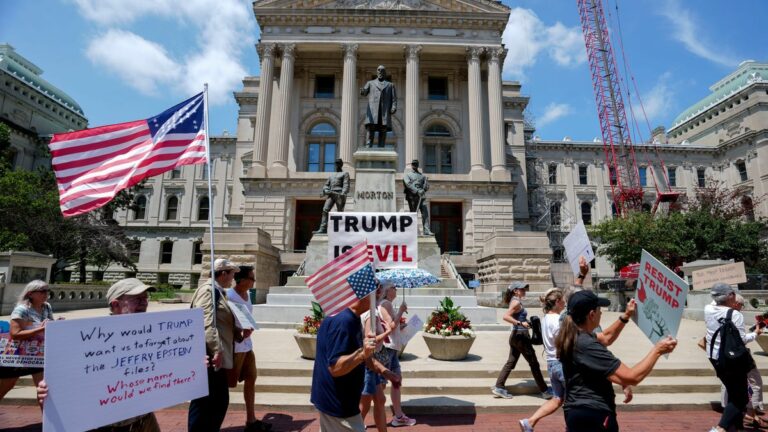If we don’t start paying attention now to what’s passed, who it hurts, and who profits – then more decisions will be made without us, about us.
Trump’s budget bill will impact every aspect of the economy
The budget bill just passed and signed into law will touch the lives of every American, one way or another. Will you be better or worse off?
Like many teenagers, I first heard about President Trump’s One Big Beautiful Bill the way I hear about most things: on TikTok. I was scrolling when a Washington Post video caught my eye. Familiar with our current president’s flair for drama, the name alone – “One Big Beautiful Bill” – stopped me. What could a bill with such a bold, bodacious title possibly have in store for us?
I watched a few more. Then I started reading the policy breakdowns and the articles that weren’t going viral. And what I found raised way more questions than answers. We’re about to inherit a mess we had absolutely no say in.
The “One Big Beautiful Bill” is being celebrated as a tax overhaul meant to bring relief to hardworking Americans. On the surface, that sounds great. Who wouldn’t want relief for hard working Americans?
But when you look closer, you start to wonder: Which Americans are we talking about? Because this bill seems to mostly help the CEOs and hedge fund guys, not the people clocking in for double shifts or surviving on food stamps.
So what’s actually in this bill?
Let’s start with health care.
This bill slashes $1 trillion in funding for Medicaid – which covers 1 in 5 Americans. It introduces a new rule: certain “able-bodied” adults aged 19 to 64 must work 80 hours a month to keep their coverage.
Sounds reasonable, right? If you’re receiving support, it makes sense to contribute.
But here’s the truth: most Medicaid recipients already do.
According to the Kaiser Family Foundation, nearly 65% of adults on Medicaid are working – often in unpredictable, low-wage jobs that don’t come with steady hours or pay stubs. Think delivery apps, house-cleaning, self-employment.
These aren’t people cheating the system. They’re holding it up.
But the new rule doesn’t just ask people to work, it asks them to prove it – online, on time, every month. For people juggling multiple jobs, unstable internet or no formal HR department, one missed upload could mean losing coverage.
And this isn’t hypothetical. We’ve seen this before.
In 2018, Arkansas tested a policy like this and over 18,000 people lost their Medicaid coverage in under a year. Not because they weren’t working, but because they got caught in the paperwork. Missed a deadline. Many didn’t even know they’d lost their coverage until they were denied prescriptions.
The bill uses the term “able-bodied” as the qualifying standard. But what does that even mean – and who gets to decide when there’s no clear federal definition?
Does this rhetoric account for people with chronic mental illnesses that don’t show up on paper? For people struggling with non-physical disabilities? No one can say, and that’s exactly the danger. When the language is vague, it becomes a tool to shut people out quietly, and without explanation.
And Medicaid isn’t the only thing on the chopping block.
Other targets include food assistance programs like SNAP which helps over 40 million Americans buy groceries each month.
The bill raises the age for work requirements from 49 to 65 for adults without dependents. According to the Congressional Budget Office, over 3 million people could lose SNAP benefits entirely.
As someone whose family has previously relied on EBT benefits, I know what SNAP means to a household. For millions of kids, it’s the reason there’s breakfast on the table before school or a packed lunch at noon. But this bill would slash billions in food assistance and limit access for students – especially in high school and college.
That doesn’t just hurt the stereotypical “welfare recipient.” It hurts your friend in AP Bio who gets free lunch and the teammate who can’t seem to focus during practice because they skipped dinner.
A cut to SNAP isn’t just a budget line. It’s something we’ll feel in our hallways, on our teams, in our generation.
To my fellow teens: Please do not let the name fool you.
The “One Big Beautiful Bill” isn’t beautiful for the people it leaves behind.
If we don’t start paying attention now to what’s passed, who it hurts, and who profits – then more decisions will be made without us, about us.
We may not have had a say in this one. But that doesn’t mean we stay silent for the next.
So keep reading. Keep asking questions. Keep showing up in your schools, your homes, your communities.
And when it’s our turn to speak, to vote, to write the laws and not just live under them – We’ll be ready.
Oyinda Solanke, 17, is a Whitestown native and a graduate of Herron-Riverside High School.

